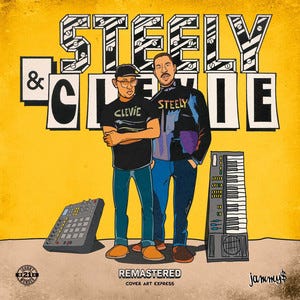Bi-Weekly-ish Newsletter #65: Apple's Surreal Ad 🤡🔥, Spotify's Excel Magic 📊🎵, Raymond Scott's Legacy 🎹🎞️, Reggaeton's Legal Battle ⚖️🥁, and Syncing for Sustainability 🌍🎶
Hiya reader,
Edition number #65 here of the biweekly-ish newsletter by yours truly: Marcel Alexander Wiebenga.
As I've hinted, keeping up with a strict bi-weekly schedule is challenging. Conference season is in full swing, and it's been a whirlwind - which is also why this edition is slightly delayed, further cementing the importance of that "-ish" in the bi-weekly-ish description.
This edition dives into Apple's latest surreal ad, Spotify's Excel wizardry, the fascinating world of Raymond Scott, a potential game-changing lawsuit in reggaeton, and a peek at an upcoming sustainability-focused music conference in Athens.
Enjoy!
1. Apple's Fiery Clown Extravaganza
When Tech Meets Surreal Cinema
I realize this newsletter sometimes becomes an amalgamation of "the best of Apple and Nike" commercials. But what can I do when the tech and sportswear giants keep serving up visual feasts that are impossible to ignore?
Apple's latest iPhone 16 ad, "Capture," is a fever dream that would make David Lynch raise an eyebrow. Director Aoife McArdle (of "Severance" fame) seems to have raided a film student's hallucinations and a circus prop closet to create this 60-second rollercoaster of weirdness.
The pièce de résistance? A flaming clown emerging from a violent cab crash, still grinning like he's just heard the world's funniest joke. Because nothing says "buy our new phone" quite like a pyromaniac's nightmare fuel, right? All of this is set to the deep-club groove of Danielle Ponder's "Roll the Credits," which feels like the perfect soundtrack for this cinematic delirium.
Is it overkill? Is it another Apple product demo triumph? It's probably floating somewhere in the uncanny Silicon Valley between the two. Beyond its shock value, this ad showcases Apple's willingness to push creative boundaries in tech marketing.
Check out the ad below and decide for yourself if Apple's descent into surrealism is a hit or a miss. Just don't blame me if you have nightmares about flaming clowns tonight.
2. Spotify's Spreadbeats
When Excel Gets Funky
As said, it's been pretty hectic being in the middle of conference season; hence, this edition is taking longer than planned/hoped. But these conferences bring good stuff. I attended the excellent Ciclope festival two weeks ago in Berlin. Ciclope bills itself as a home to those who believe in the power of craft. A bespoke platform for creative professionals worldwide to get inspired, build professional networks and elevate their work. As lofty as that may sound, it lives up 100% to this promise.
During its annual awards ceremony, some fantastic work was shown. *Incoming humble brag* Interestingly, most of the winners were discussed and shown in this very newsletter, most notably the winner of the grand prix in the music video category: A$AP Rocky's "Tailor Swif" video directed by Vania & Muggia. Another grand prix winner, in the innovation category, I did totally sleep on and wanted to share here.
Spotify's "Spreadbeats," is a B2B campaign that's so meta it hurts. Picture this: a music video created and distributed entirely within a media plan spreadsheet. Yes, you read that right. Spotify has managed to make Excel exciting - a feat I thought was about as likely as me enjoying a Wes Anderson film marathon.
The campaign follows a single cell—E7—as it evolves into a colorful 3D character. Spotify coded the entire music video directly within Excel, using built-in functions like ASCII, Graphs, Unicode, and conditional formatting. It's like they turned Excel into a Minecraft for marketers.
The soundtrack? Produced by US DJ John Summit, who apparently knows his way around a spreadsheet almost as well as a DJ mixer. In an interview, he stated, "My first ever job was in accounting." I can't decide if that makes him more or less cool.
This campaign is innovative beyond being "meta" because it demonstrates Spotify's understanding of its B2B audience. It uses a medium (Excel) central to their daily work and turns a mundane tool into a creative platform. I very much like both the idea and execution, but don't take my word for it. Check it out below and see for yourself, or watch one of the case studies, right here.
This is an ad…
While Spotify is turning spreadsheets into music videos, at Ringo, we're transforming the way you license music for your actual videos (Excel not required).
Imagine finding the perfect track for your project faster than Spotify can animate a spreadsheet cell. That's where Ringo comes in. Our algorithmic pricing tool determines Expected Sync Value (xSV) with more precision than an Excel formula.
We're bridging the gap between artists and agencies, making sync licensing as smooth as a well-produced beat. No need for fancy spreadsheet tricks - just straightforward, efficient, and fair music licensing.
👉 Join the waitlist for Ringo's beta at www.thisisringo.com and soon you'll be able to: ✅ Upload Spotify playlists of tracks you're interested in
✅ Specify terms (e.g., Apple, 1 year, all media, US)
✅ Get instant algorithmic ballpark prices for each track
Sign up now for early access. Your future self will thank you - and who knows, maybe you'll create the next viral video without ever opening Excel.
3. Raymond Scott
The Godfather of Synthetic Bleeps and Blobs
I also attended Amsterdam Dance Event last week, or, as it's collegially known in the neighborhood, the Dutch part of the Tour de France. A bunch of people doing drugs riding bikes.
ADE was great. I met amazing people and saw some incredible things, but after four days, I was wholly overstimulated with 4-on-the-floor bass drums and utterly saturated with synthetic-related bleeps and blobs. It was, therefore, ironic that when I told this to my girlfriend, she insisted on introducing me to Raymond Scott, the godfather of synthesized bleeps and blobs I had never heard of. After recuperating for a few days, I dove into the legend's world, and it's pretty cool.
Although not a household name, Raymond Scott is a fascinating figure in music history. This American composer and bandleader pioneered electronic music, developing some of the first sequencers and synthesizers, and founded one of the world's first electronic music studios. From jazz compositions in the 1930s to countless hymns to hunger, odes to cigarettes and pilsner in the 1960s, Scott elevated advertisement music/jingles to an art form.
The jingle, over time, has gotten a bad rep for being cheesy, but perhaps it's time for a jingle renaissance - after all, who doesn't want a catchy tune stuck in their head along with a brand name? Check out the Sprite commercial below that Scott composed. It's a perfect example of how a soft drink can sound like a work of art.
4. The Reggaeton Rhythm Lawsuit
When Beats Get Litigious
No matter how much you know about reggaeton, you're likely familiar with that unmistakable two-bar beat: boom ch-boom-chick. It's at the heart of countless hit songs and is now at the center of a landmark copyright lawsuit.
The estates of Jamaican producers Cleveland "Clevie" Browne and Wycliffe "Steely" Johnson are suing some of music's biggest stars, including Bad Bunny, Rauw Alejandro, and Daddy Yankee. They claim these artists have infringed on the copyright to their song "Fish Market," allegedly the first track to use the iconic boom ch-boom-chick beat. If they win, artists might need to pay up to use one of popular music's most recognizable rhythms.
But here's the catch: copyrighting a rhythm isn't straightforward. Traditionally, copyright cases focus on melodies, hooks, or lyrics - elements more easily notated in Western musical tradition. This has often left rhythm-based music, particularly from non-European cultures, vulnerable to appropriation without legal recourse.
The 2015 "Blurred Lines" case set a precedent when Pharrell Williams and Robin Thicke had to pay over $5 million to Marvin Gaye's estate, based on the song's "feel" rather than specific melodies or lyrics. This ruling has music copyright experts on edge.
Music copyright expert Brian McBrearty explains:
"Rhythm elements by themselves are not very protectable to begin with. This one is both brief and straightforward, which makes it enjoyable, but doesn't help make it protectable."
The court faces a challenging task in determining whether Steely & Clevie's claimed elements are protectable under the law.
If Steely and Clevie win, it could open the floodgates for copyrighting rhythms. Imagine having to license the iconic four-on-the-floor beat - the Ramones might be rolling (and cashing in) in their graves.
What do you think? Should rhythms be copyrightable, or is this a step too far? Let me know your thoughts, and in the meantime, enjoy your favorite reggaeton tracks while they're still freely available.
5. Act in Synch
Where Music Meets Sustainability in Athens
And finally, because conference season is far from over (and let's face it, who doesn't love a good excuse to visit Greece?), I'll be attending Act in Synch: The Athens Edition.
This isn't your typical music industry schmooze-fest. Act in Synch brings together the cool kids from music, tech, and sustainability to tackle the not-so-cool issue of climate change. Their mission? To inspire action by examining our relationship with the planet and the decisions we make.
I'll join a talk on "The State of Tech in Music Supervision and Beyond." We'll be exploring whether, in our tech-driven world, we're all becoming music supervisors. Spoiler alert: I'll argue that AI can't replace the human touch in choosing the perfect song for a heartbreak scene... yet.
Clément Souchier from Bridge.Audio and Jonathan Fröberg from Universal Music Publishing Group join me on this panel. We promise to keep the tech jargon to a minimum and the sustainability puns flowing as we sip ouzo by the Aegean.
The event takes place on October 30-31, 2024, at Impact Hub Athens. Tickets are available now, so if you fancy combining climate activism with a late autumn tan, check out www.actinsynch.com for more info. And if you can't make it in person, you can join online.
Opa! That's the end of this newsletter. Hope you enjoyed it. See you in Greece or in the next edition of this newsletter.
If you find this newsletter interesting, why not share it with a friend who might enjoy these musings? And as always, I'd love to hear your thoughts - hit reply and let me know what resonated with you!
Marcel




